معلومات عنا
حقوق الطبع والنشر © 2024 Desertcart Holdings Limited
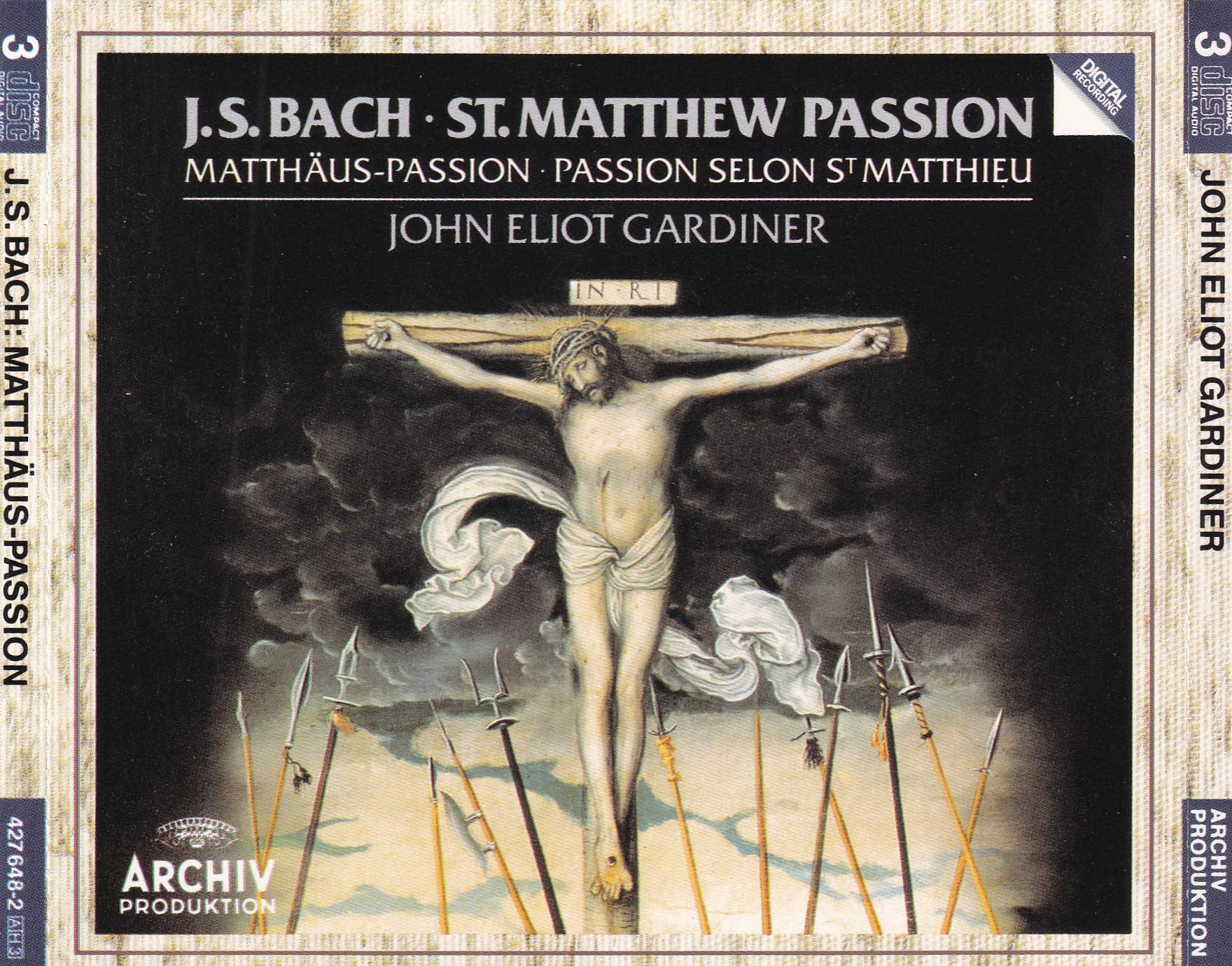

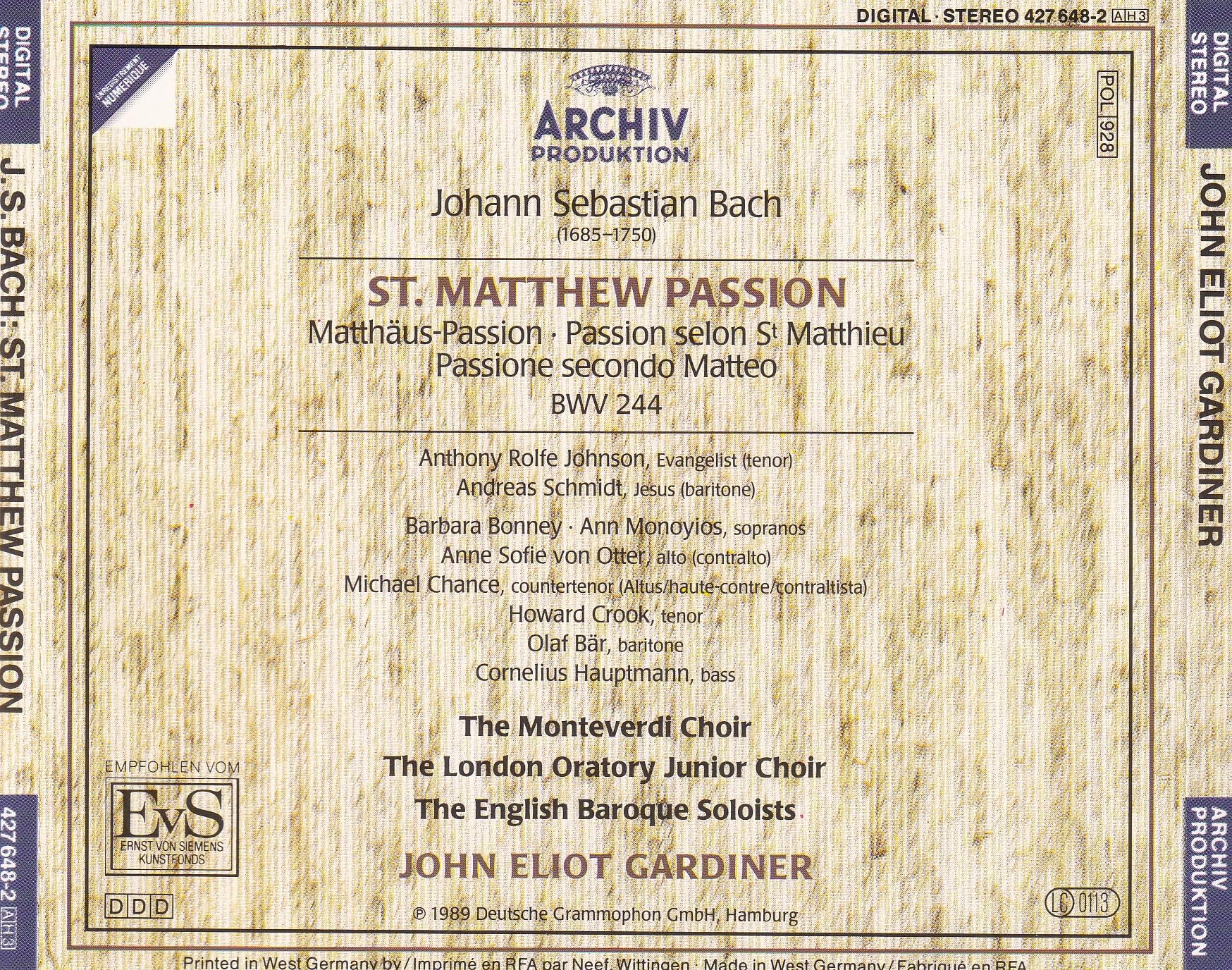
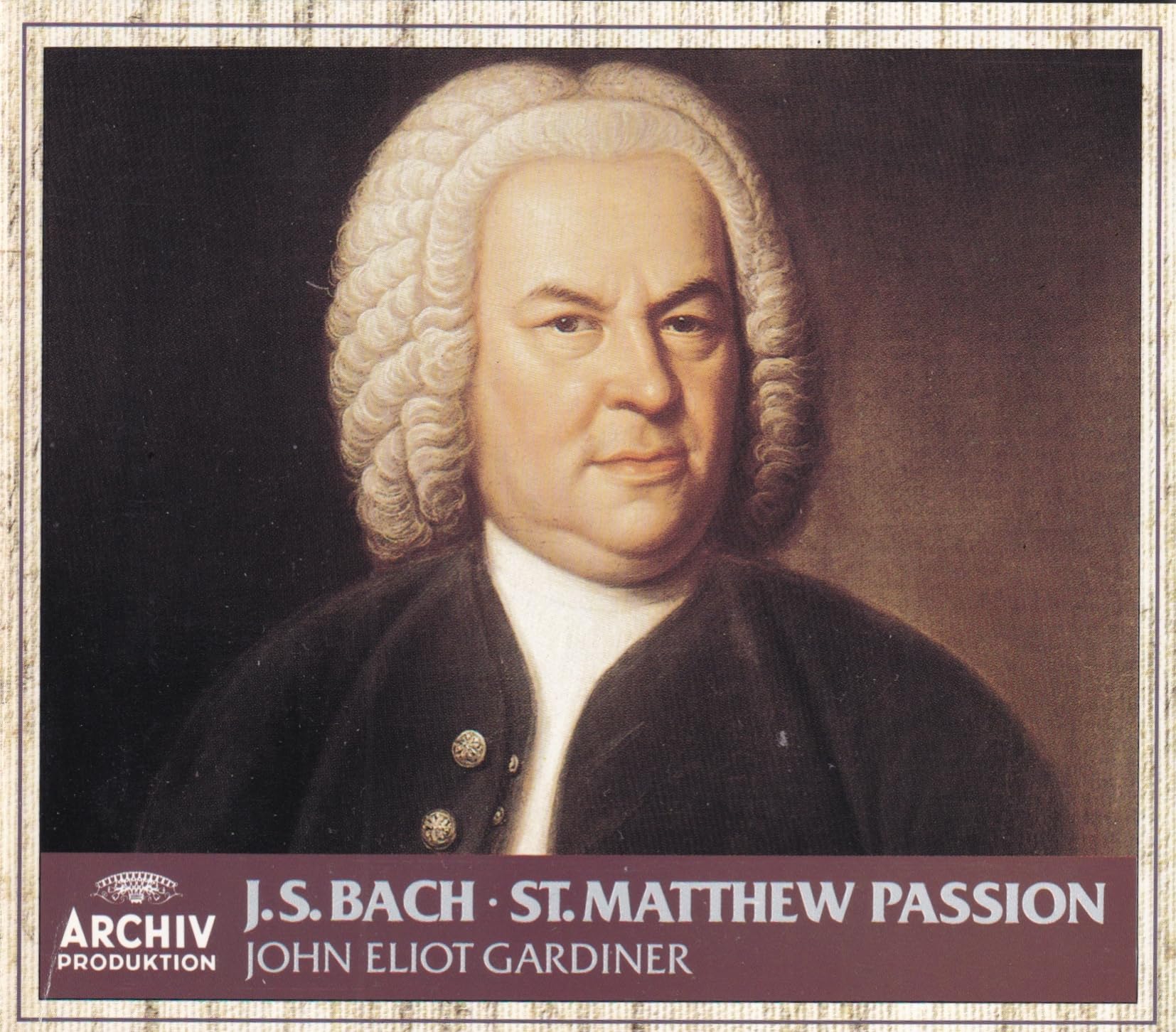
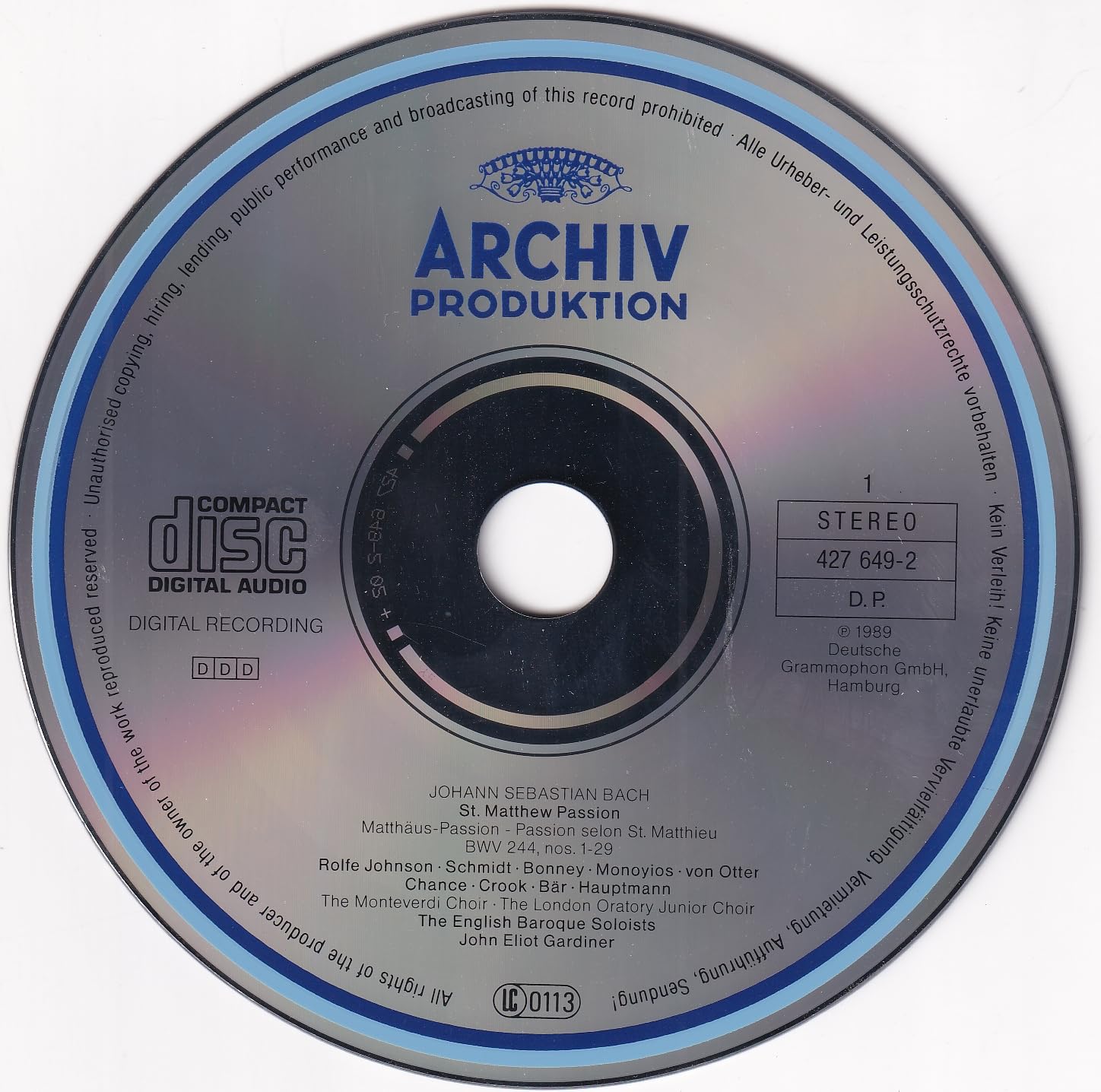
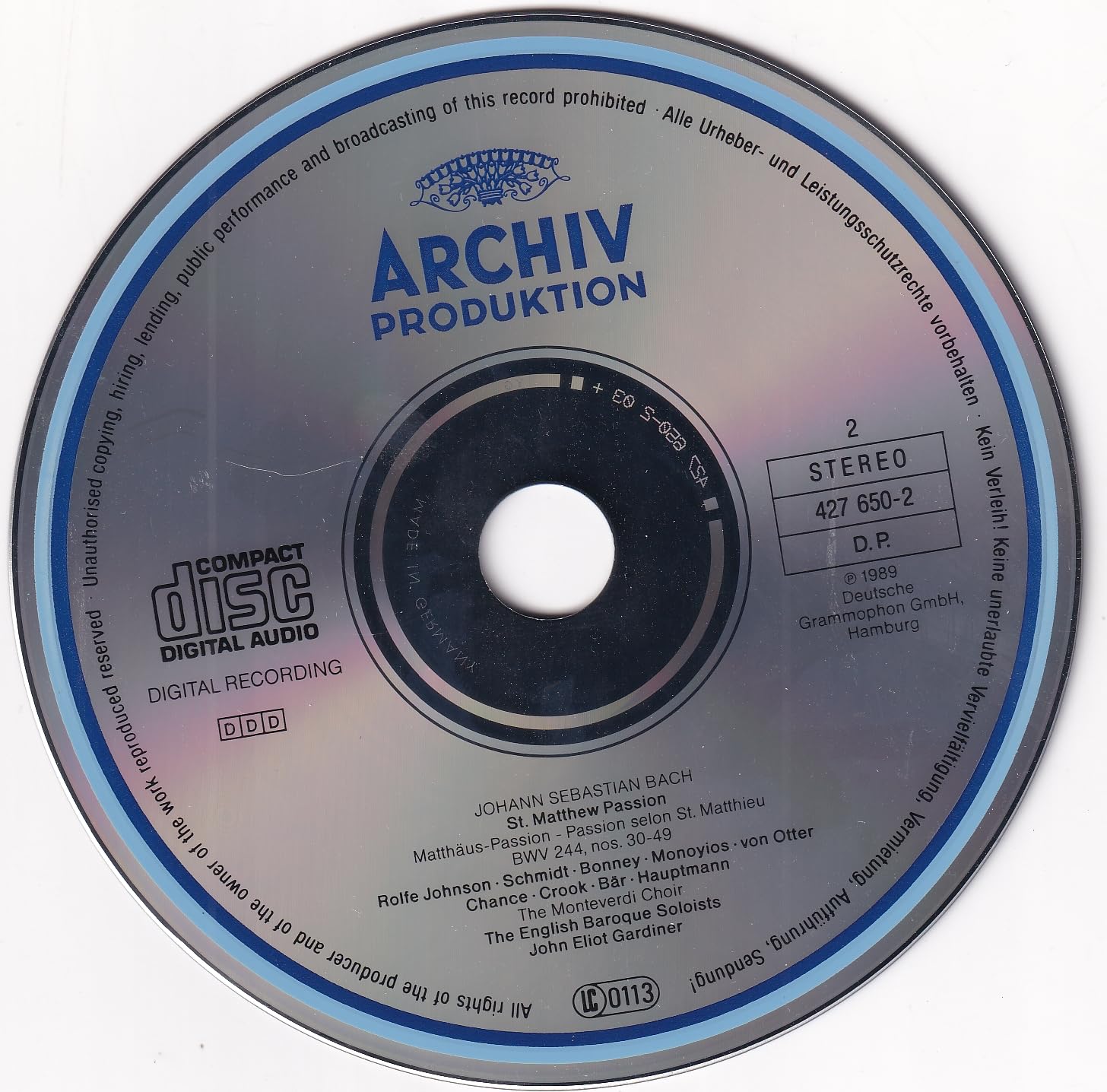
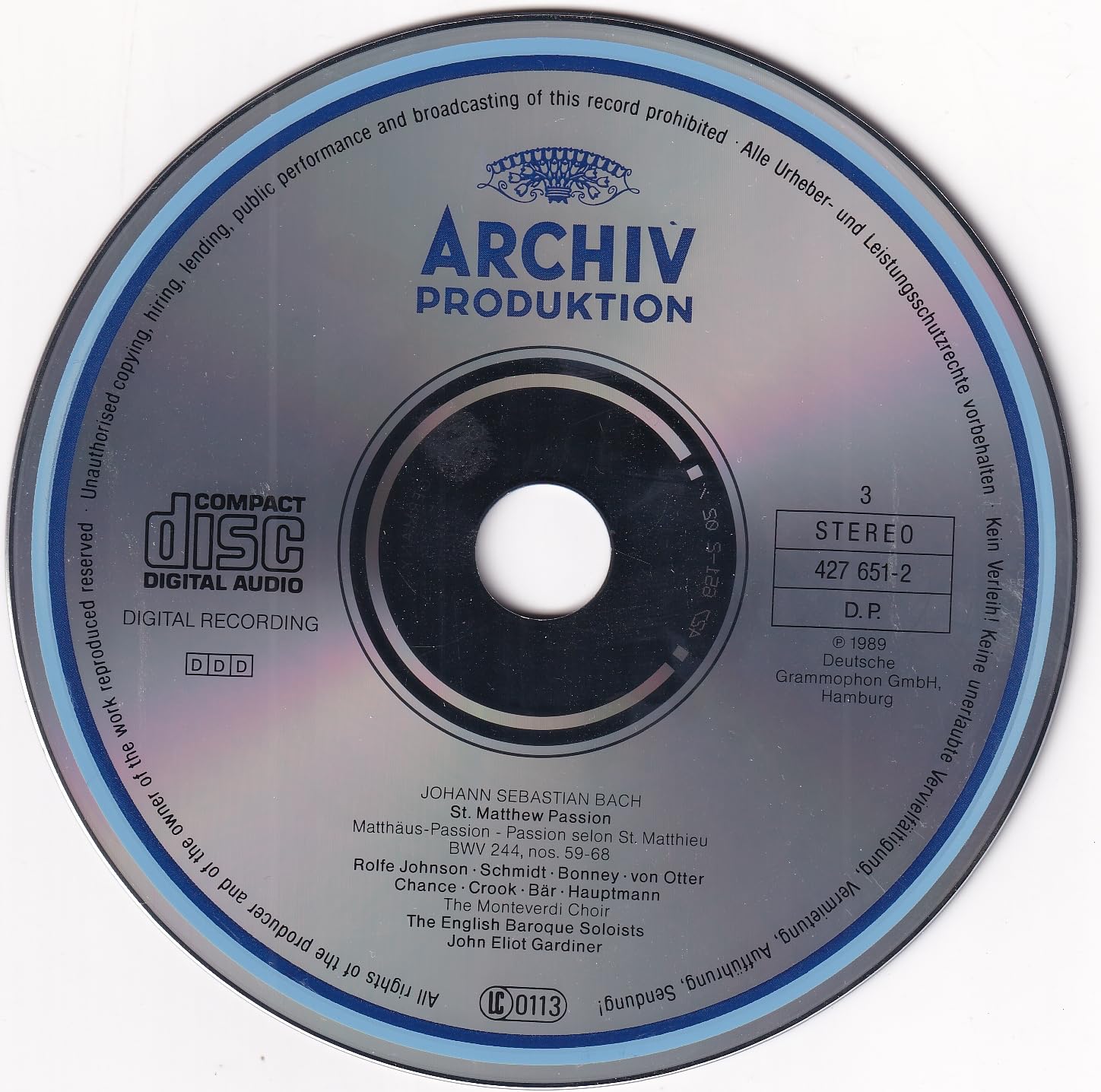
Product Description Bach: St Matthew Passion / Gardiner, Rolfe Johnson, Et Al . Release Date: 10/20/1989 . Label: Archiv Produktion (Dg) . Catalog #: 427 648 . Spars Code: DDD . Composer: Johann Sebastian Bach . Performer: Barbara Bonney, Ann Monoyios, Anne Sofie von Otter, Howard Crook, ... Conductor: John Eliot Gardiner . Orchestra/Ensemble: English Baroque Soloists, Monteverdi Choir, London Oratory Junior Choir . Number of Discs: 3 . Recorded in: Stereo . Length: 2 Hours 37 Mins. Works on This Recording: 1. Saint Matthew Passion, BWV 244 by Johann Sebastian Bach Performer: Barbara Bonney (Soprano), Ann Monoyios (Soprano), Anne Sofie von Otter (Mezzo Soprano), Howard Crook (Tenor), Michael Chance (Countertenor), Olaf Bär (Baritone), Cornelius Hauptmann (Bass), Andreas Schmidt (Baritone), Anthony Rolfe Johnson (Tenor) Conductor: John Eliot Gardiner Orchestra/Ensemble: English Baroque Soloists, Monteverdi Choir, London Oratory Junior Choir Period: Baroque Written: Circa 1727; Leipzig, Germany Date of Rec .com John Eliot Gardiner's reading of the Matthew Passion is conceived and executed on the highest level, an example of period practice that is unlikely to be bettered any time soon. The performance as a whole vibrates with life: soloists are first-rate, and wonderfully well chosen for their respective parts, and the work of chorus and orchestra is exemplary. The recording, made in 1988 in the spacious ambience of Snape Maltings (England), is well balanced and exceptionally vivid. --Ted Libbey
T**4
A close second to Robert Shaw/Telarc, but ...
I sing tenor in a local community chorus. When we are about to begin rehearsals of a choral work I haven't done before, I get a recording of it. I generally look to Robert Shaw on Telarc first because it has been my experience that I can hear the voices clearly and even understand the words.There are some I haven't found: the Mahler 2nd Symphony, Schumann: Scenes From Goethe's Faust and Berlioz: L'enfance du Christ.When we began the St. Matthew Passion, I did not find a Telarc recording. There must over 50 recordings of it but no Telarc. I read review after review. I finally asked our director, David Chase: John Gardiner, he said.The performance is exciting, the soloists are very good. But the words are not as clear as I know they could be. The chorus, at times sounds a brittle. Particularly when the children's choir is singing.Having a large and very powerful sound system means I don't have to push it very hard to get realistic levels (100 to 105 dB SPL. The Mahler is very impressive). 95% of the time the Gardiner recording is very good. My thought is there may have been too many microphones so the consonant sounds are not as crisp as they could be.However, the exciting performance makes up for it.
R**N
My new favorite recording; such vitality and clarity.
Recorded and sung with such clarity and vitality. This has become my new favorite version, if at times a little fast for my liking. But it keeps moving at a pace and is such a joy to listen to. Superb soloists - without exception.
C**Y
It's still the Gold Standard
In this age when every early music conductor -- and many others for that matter -- attempt this Mount Everest of Bach's compositions. Eliot Gardiner's reading of the score with all its deep religious feeling and drama, always leaves me in tears no matter how many times I hear it. Whether you are motivated by this ultimate religious event, or by Bach's setting of it, or both, I don't believe a finer recording of it exists, that is except perhaps, in paradise.
O**X
This is a solid performance of this work; one of the best
I simply do not understand why there is such harsh criticism about this recording of Gardiner's. His performance is certainly not perfect, but it is not so bad as to derserve the kind of criticism such that makes this work into a joke! This work is definitely no joke, but, on the other hand, is very serious and somber in nature because the passion of Christ is serious subject matter. And when listening to this version of St. Matthew's Passion there is NOTHING that takes away, or distracts from the true motivation behind this work, which is a meditation on the text, and the mood with the texts on the sufferings of Christ. If it is only shallow emotion, booming vocalists who have their fists clenched, or an overly-dramatic conductor that one desires in this recording, then instead of this recording, purchase some romantic composition such as Beethoven, Brahms, etc. However, if one desires to meditate on the sufferings of the Savior of mankind,(which was Bach's true intention for this work) then purchase this recording. In my opinion, the piece that truly stands out and should receive nothing but praise is the opening chorus (Kommt, ihr Tochter helft mir klagen/ O Lamm Gottes, unschuldig) If you listen to nothing else in this compilation, at least listen to this particular opening chorus because it is one of, if not THE greatest moments in all of Bach's works. I have heard slow, drawn-out romantic versions of this chorus, and choppy, march-like versions, however one will not go wrong with Gardiner's version. As for comparing and contrasting the styles of the two famous Bach performers in that of Herreweghe and Gardiner, the two are so much alike with their tempos that if one of them is criticized for taking a piece too fast then both of them should! What it comes down to is that one cannot go wrong with either of the two conductors for they are both good in their own right. It is true that Gardiner takes many of the pieces too fast, which is why this recording is not worthy of five stars, and his ensemble is a bit too large, however the skill of his performers makes up for that and the two extremes of an oversized Karajan ensemble and an undersized Rifkin ensemble are the alternatives. Gardiner's ensemble is small enough that one can hear all the parts, not as clearly as a Herreweghe and especially a Rifkin however, but large enough to not be an overpowering, jumbled mess of unclarified sound. I do share the criticism of those who think that Gardiner rushes through the chorales in particular, however I do NOT share the thought that they lack passion and feeling. As said before, Baroque music is NOT ROMANTIC music, and a characteristic of such style would be extreme fluctuations of softness and loudness containing more variations of depth in the music (which some label as "emotional" and "feeling") And yes, romantic music IS more of an emotional style of music for those very reasons. But that does not mean that BAROQUE music also contains these qualities. Another criticism for this recording has to do with those very attributes of romantic music, of which are sadly found in the the chorus (O Mensch, bewein dein Sunde gross). In this particular chorus, Gardiner not only takes the tempo too quickly, but varies the tone quality far too much. The chorus is almost whispering "O" at the beginning of the piece as if they do not want you to hear them, yet they develop too loudly near the end. This I found very disappointing because the the sound that is supposed to be heard the very moment the voices join with the instruments should a blending or meshing quality rather than a drowned out, sorry-sounding whisper. Despite these criticisms, do not let them detract you from valuing this recording, because every recording has its flaws and this one has very few.
H**S
Bach Matthäus Passion BWV 244 on Archiv (Deutsche Grammohone recording 1989)
Dispite this Matthäus Passion was recorded in 1989, the sound quality still is outstanding when compared with nowadays standards.The combination of the beautiful, warm timbre of the voices of the soloists, the Monteverdi Choir, the London Oratory Junior Choir, accompanied by the English Baroque Soloist, all over conducted by John Elliot Gardener, have made this recording to a memorable document.Deutsche Grammophone GmbH has proven with this recording its superior recoding technique.Highly recommended!
B**M
Exquisite Bach with John Eliot
I was looking for a Herreweghe recording of the Bach St. Matthew Passion, but John Eliot Gardner's rendition is absolutely awesome too. Glad to find it as Herreweghe's is only on You Tube. Anyway, both are just 'Divine!' :)
F**R
Couldn’t have asked for more!
The entire set appeared as though brand new and all played flawlessly!
A**R
Higher power
For those days you need to elevate your intellect
R**F
Imensamente satisfeito.
Sem dúvida uma das melhores interpretações dessa obra prima. Nível máximo de excelência em um box maravilhoso.
S**N
Five Stars
Beautiful recording, bought to replace the same recording I'd enjoyed for years before it got lost
J**V
Sublime
I bought this having read a brilliant book East West Street. It describes a lawyer, Lauterpacht, who escaped before the war from his home in Lvov (then Poland, now Ukraine) and listened to the Passion while working in Cambridge on the offence of Crimes against Humanity which he helped bring forward at the Nuremberg trials. Likewise, one of the Nuremberg defendants, Hans Frank, (hanged) listened to the Passion while working as Gauleiter of Poland, orchestrating the deaths of thousands, if not millions, including, unbeknownst to Lauterpacht at the time, most of his family. And, in all probability, my grandfather’s who lived nearby.Curiosity led me to spend three hours of Good Friday listening through my excellent headphones, following it word by word. A quite beautiful experience.Gardiner's version is the only one I have heard - having studied reviews of most others - so I can't say how I would feel about say Klemperer's reportedly slower pace. But I found this pace comfortable, and the singing (soloists and choruses) and orchestra quite sublime.
C**5
interprétation de référence
La prise de son est très correcte sans être exceptionnellement claire. Cependant la dynamique est intéressante. Les voix sont assez "perdues" dans la masse. Les choeurs sont très présents.Sur le plan interprétation, c'est une référence du genre. On y retrouve toutes les nuances et les intention d'un live.
U**S
Der Maßstab
Für mich ist diese Aufnahme der Maßstab, an dem sich alle Nachfolger messen müssen.Wenn man Anfang der 80er Jahre Aufnahmen mit historischen Instrumenten hörte, mußte man mit den Zeitgenossen Bachs und Händels Mitleid bekommen. Kieksende, unsaubere Bläser und kratzende Streicher begleiteten piepsige Knabensoprane und hauchende Kontratenöre. Das taugte bestenfalls als Beweis für die Überlegenheit des modernen Instrumentariums. Doch dann kamen die englischen Ensembles mit Gardiner und Hogwood und zeigten, daß es auch anders geht. Diese Matthäuspassion war für mich damals eine Offenbarung.Für mich steht und fällt die Qualität einer Passionsaufnahme mit den Chorälen, und die reißen mich bei Gardiner mit, während viele seine Nachfolger (zB Herreweghe) sie bloß als biederen, langweiligen Gemeindegesang darbieten. Nicht-Muttersprachler, auch Profis, haben hier meiner Meinung nach einen gewissen Nachteil, weil sie die Worte nicht unmittelbar erfassen und umsetzen wie Muttersprachler - beim Monteverdi Choir aber ist davon nichts zu spüren.Keiner möge sich hier von der Kritik an angeblich zu schnellen Tempi Gardiners beeindrucken lassen. Für mich stimmen seine Tempi einfach. Sicherlich ist das letztlich Geschmackssache, aber es stimmt einfach nicht, daß Gardiners Matthäuspassion gehetzt klingen, oder die Feinheiten und muskalischen Höhepunkte untergehen würden.Ich würde diese Aufnahme jederzeit wieder kaufen. Daß sie teurer ist als andere Aufnahmen ihres Alters, hat seinen Grund.
ترست بايلوت
منذ شهرين
منذ شهرين